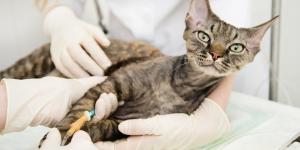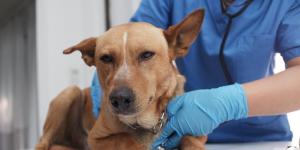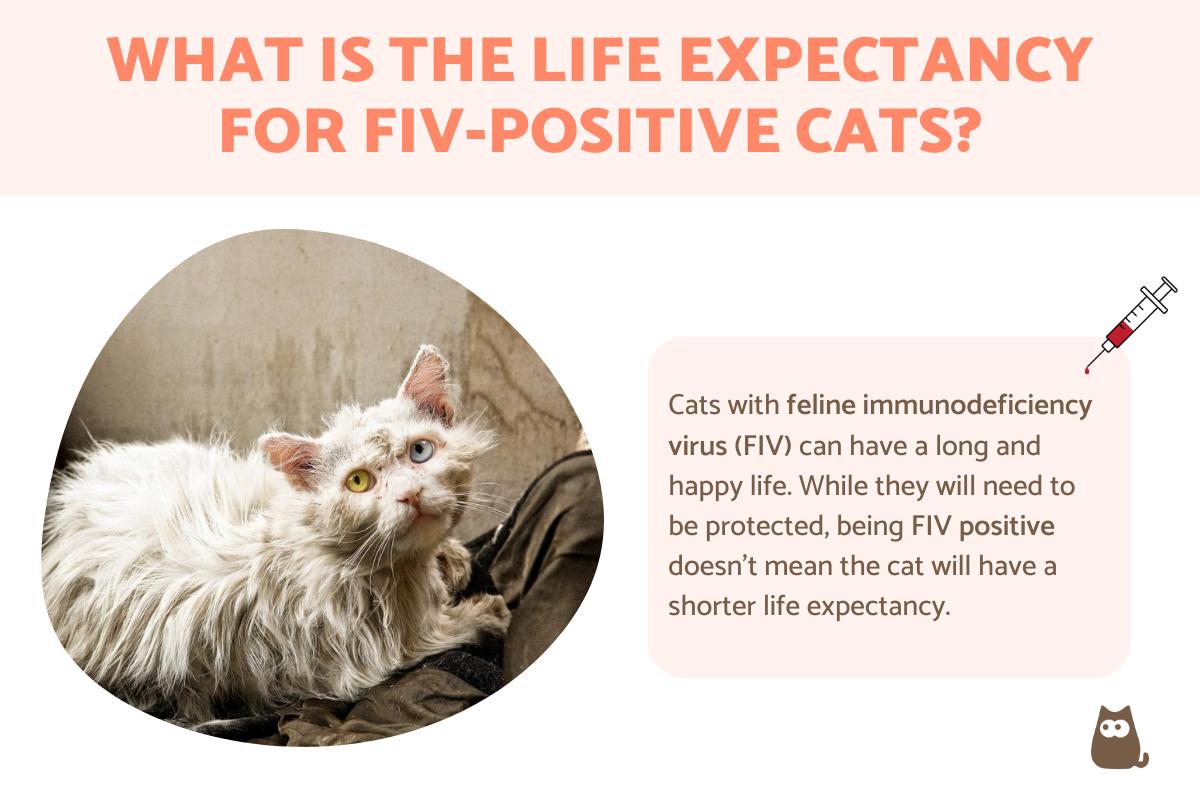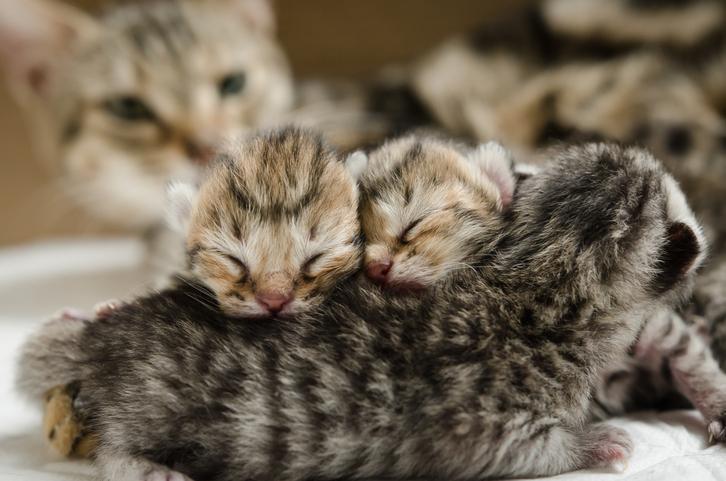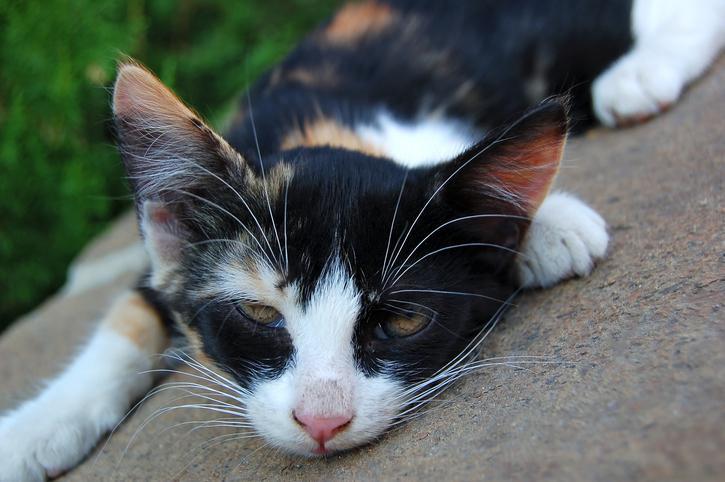What Is the FIV in Cats Life Expectancy?



See files for Cats
Similar to human immunodeficiency virus (HIV), the feline immunodeficiency virus (FIV) is a retrovirus which seriously compromises the immune system of cats. This means they are unable to respond appropriately to various pathogens and diseases. Even diseases which would otherwise not cause significant harm to cats can be life threatening to FIV positive cats. If your cat has been diagnosed FIV positive, it means their health status becomes unstable and uncertain. While certainty cannot be given, it is true that the average FIV cat life expectancy is reduced due to their compromised immune system.
AnimalWised helps you to learn more about what to expect by asking what is the FIV in cats life expectancy? We look at the treatment options available to increase the FIV positive lifespan, as well as what other factors influence the prognosis of an FIV positive cat.
What does FIV positive mean?
An aggressive and potentially life threatening virus, the feline immunodeficiency virus (FIV) is a relatively recent discovery in veterinary medicine. It was first isolated in the mid-1980s in a community of feral cats, but it has since been transmitted to domestic cats due to its severe virulence. It is classified in the genus Lentivirus, a genus of retroviruses which are known for having long incubation periods.
FIV affects different types of immune cells in the cat's body. It stops them from functioning properly, meaning that the cat's general immunity is worsened. As it is a lentivirus, it does not often work very fast. The cat may be completely asymptomatic for a very long time (i.e. they don't show any visible symptoms). If this happens, it means they are a carrier and have the potential to pass it on to other animals.
If your cat is FIV positive, it means they have tested positive for the feline immunodeficiency virus. It is one of the many parallels between FIV and HIV/AIDS (human immunodeficiency virus/acquired immunodeficiency syndrome). Both are retroviruses which suppress the immune system. This as lead to many referring to the condition as feline AIDS or feline HIV.
How is FIV transmitted in cats?
Since the disease affects the central nervous and immune systems, it needs a vector to transfer from one individual to another. This vector is usually saliva. This means it is often passed on through biting. This doesn't mean the kind of biting cats perform when playing. It means a deep bite wound which goes down far into the tissue and meets the blood of the animal.
As the disease is most often passed on through biting, it is much more common in male cats than in females[1]. This is because older male cats are more likely to fight with other cats for territory and mates. Feral cats are also more likely to pass on the disease, but if you have an outdoor cat with feral cats in the area, it increases the risk.
There are other methods of transmission, but they are much less common. These include sexual activity and intrauterine transmission, i.e. when the kittens are in the womb. After they are born, it can be passed on via breastfeeding and even by sharing the same feeding dishes and containers. This last mode of transmission is rare.

FIV symptoms in cats
FIV is manifested in various ways and it will, to a large extent, depend on the individual cat. Some of the common symptoms, however, include:
- Fever
- Loss of appetite
- Runny nose/mucous discharge
- Eye discharge
- Urinary tract infection
- Diarrhea
- Skin injuries
- Mouth lesions
In more advanced clinical cases, the animal may develop:
- Respiratory problems
- Renal (kidney) failure
- Tumors
- Cryptococcosis
Between six and eight weeks after infection occurs, the acute phase of the disease usually occurs. However, symptoms may not appear for several weeks or maybe not even at all (as stated above).
Diagnosing FIV in cats is not always easy. A serological test is usually carried out, meaning the cat's fluids are tested in laboratory conditions. The results need to be properly examined by a specialist, so not all veterinarians will have the right equipment to do so in their clinic. The tests will usually look at the levels of antibodies, but as it can take time for the infection to activate, a cat can initially have a negative result, but become FIV positive afterwards.
Due to a weakened immune response, you may notice your cat has a wound that is not healing. This can be a sign of being FIV positive since the immune system has difficulty in repairing the lesion.
FIV treatment in cats
As FIC is often asymptomatic, your cat may not appear to need any treatment. In humans, HIV/AIDS is treated with antiviral drugs. Similar antiviral drugs such as Ribavirin or Zidovudine may be used. However, not only is the efficacy of the drugs “generally poor”[2], the cost and lack of availability mean they are not usually implemented. This is something which further complicates prognosis and can affect the lifespan of FIV positive cats.
Instead of treating with antivirals, the symptoms of FIV and any secondary diseases which occur are managed. This may include fluid therapy, blood transfusion or antibiotics. General well-being also needs to be maintained. The cat will likely be placed on a specialized diet and we need to be extra careful in protecting them from secondary diseases.
Since cats with FIV are both very vulnerable to attacks on their immune system and to transmission of the virus to other cats, certain precautions need to be implemented. They should not be allowed to go outside, both for their safety and those of others. Keeping them indoors may seem cruel, but going outside puts them at risk of attack and transmission of the virus.
Some other considerations need to be made if a cat is FIV positive:
- Diet: ensuring the cat has a suitable diet which is of high quality will help to strengthen their immune system. If they are fed poorly, their organism is weakened against possible disease.
- Stress: a mitigating factor in a cat's immune status is stress. Cats with FIV are more vulnerable, so a state of stress can dispose them to a lowered immune system. Ensure they are kept in an environment which is calm and meet their needs adequately.
- Vaccinations: we need to ensure we comply with a vaccination schedule instituted by the veterinarian. This helps to provide a preventive barrier against new infections which are common to a particular region.
- Deworming: similar to vaccinations, we must also comply with a suitable deworming schedule to prevent parasitosis.
- Regular checkups: cats with FIV will usually need more regularly veterinary checkups to assess their health status, something which can help to improve life expectancy if we catch a disease early.
Should I separate a FIV-positive cat from other cats?
It is common to consider whether a cat with FIV should be separated from other cats to avoid infection. Although the virus is spread through saliva, this only usually occurs when a deep bite wound occurs. Normal behaviors such as grooming or sharing water dishes should not be a transmission route for the feline immunodeficiency virus.
Only when a cat with FIV is considered aggressive to other cats should they be separated. In this case, the potential for bite wounds and scratches increases the risk of a viral infection.
It can be difficult to keep a cat indoors if they have previously been allowed outdoor access. Learn more about what to do with our article on indoor cats that want to go outside.
What is the life expectancy for cats with FIV?
There is no specific life expectancy for a cat with feline immunodeficiency virus. It will wholly depend on the individual. However, as there is no cure for FIV, it will be important to manage the cat's symptoms if you want to extend their life as long as possible. The treatment above will help to fight individual health issues which may shorten their life expectancy, but it will depend how well their immune system can be maintained.
Ensuring the cat has everything they need in terms of comfort and well-being is also important. While they may not respond well to being a house cat, cats should be kept indoors, both to protect them against disease and protect other cats from infection. A dietary change may also be required, but this is something you will need to discuss with your veterinarian after diagnosis.
Some have asked the question over when to put a cat down with FIV. The veterinary medical community is still debating the question over whether euthanasia is appropriate for the feline community as a whole. In general, if a cat is too weak and has a seriously diminished quality of life, euthanasia may be considered as a possibility. Otherwise, we should keep the cat alive as long as we can still provide a good quality of life.
Other factors can influence the lifespan of an FIV-positive cat. These include any concurrent health problems, as well as environmental issues. However, a cat with FIV can have the same life expectancy as an FIV-negative cat in the right circumstances.

How to prevent FIV in cats
The best way to fight this virus is to prevent it, so some basic steps must be taken. In virus-infected cats, the use of antiviral drugs may be recommended in the initial stages of the infection. The objective is to reduce the chances of the virus replicating and help reduce the severity of the symptoms. It is also designed to reduce the spread of FIV to other cats.
As feline immunodeficiency virus is contagious, limiting the methods of its transmission are imperative. Sterilization is the main method of prevention for two main reasons:
- As FIV can be spread in utero, spaying prevents fertilization and birthing kittens which are FIV positive. Kittens birthed by an FIV-positive mother need to be taken away from her in case she spreads the virus, something which can seriously harm their development.
- Sterilization in male cats will also reduce aggression with other cats and help prevent fighting. In doing so, it can help reduce transmission of FIV.
Additionally, any environmental factors will need to be considered. Ensure their living space is well-ventilated and all of their resources are nearby (especially if they have been weakened for any reason). These include their water, food, bedding and anything else they need.
Vaccination is available for FIV, but its efficacy is still in question and the literature suggests new developments are required to improve said efficacy[3]. Keeping the cat up to date with their other vaccinations and deworming schedule is still very important in reducing secondary disease. It is also important to note that FIV is intraspecies specific, meaning that it will can't be transferred from feline to human.

This article is purely informative. AnimalWised does not have the authority to prescribe any veterinary treatment or create a diagnosis. We invite you to take your pet to the veterinarian if they are suffering from any condition or pain.
If you want to read similar articles to What Is the FIV in Cats Life Expectancy?, we recommend you visit our Viral diseases category.
1. Fletcher, N. F., Meeker, R. B., Hudson, L. C., & Callanan, J. J. (2011). The neuropathogenesis of feline immunodeficiency virus infection: barriers to overcome. Veterinary journal (London, England : 1997), 188(3), 260–269. https://doi.org/10.1016/j.tvjl.2010.03.022
2. Hartmann, K., Wooding, A., & Bergmann, M. (2015). Efficacy of antiviral drugs against feline immunodeficiency virus. Veterinary Sciences, 2(4), 456–476.
https://doi.org/10.3390/vetsci2040456
3. Hosie, M. J., & Beatty, J. A. (2018). Lessons learned in developing a commercial FIV vaccine: The immunogen, the feline patient, and the test of time. Viruses, 10(5), 277.
https://doi.org/10.3390/v10050277

